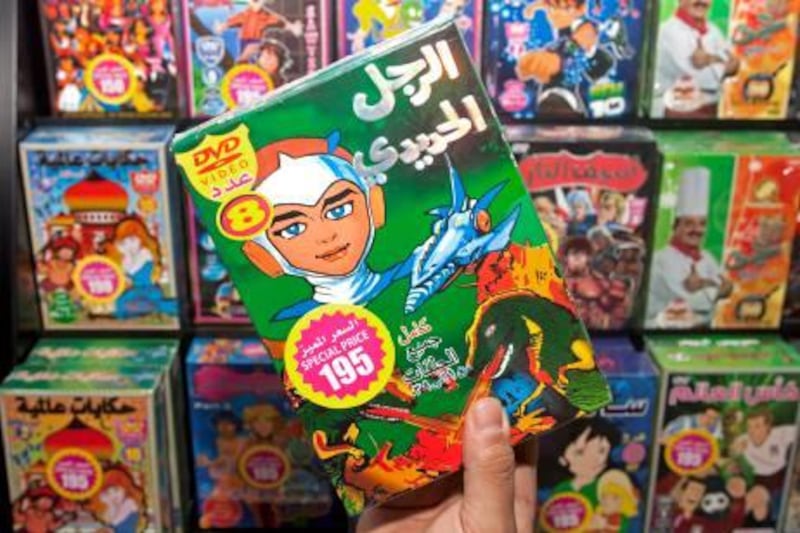ABU DHABI // When the two main characters in a short UAE film started singing, the audience clapped and sang along.
But the songs in Ahmed Arshi's five-minute short On the Road were not traditional Emirati music, or Arabic pop hits - they were tunes from Arabic dubbed Japanese cartoons. They triggered such a reaction because they came from the anime series on which a generation of Emiratis grew up. "If you were an Arab child living here in the Gulf in the 1980s and 1990s, then you grew up and fell in love with the same Japanese animation as everyone else," Mr Arshi, 30, said.
Sitting in the audience as his film was screened at the Gulf Film Festival in April, Mr Arshi joined in the chorus of songs. Afterwards, he was approached by other Emiratis and Gulf nationals who thanked him for reawakening the "fondest memories" of their childhood. "They have become part of our culture," he said. Now, the same characters are recapturing Arab hearts as they are reissued on DVD. "I am buying them all and rewatching them, and they are even better than I remembered," Mr Arshi said.
Until the cartoons were taken off the screen in 1995, UAE children would tune in to them - often with their parents - at 4pm every day. "We would never miss an episode. If we did miss or not see an episode, we would ask around and borrow each other's VHS tapes and the friend who had the whole series was always the one most envied," Mr Arshi said. The series was the product of the GCC Joint Production Program Institution, set up in 1976 to make television programmes for the region.
It hired Kuwaiti, Iraqi and Syrian actors to dub more than 50 Japanese animations into Arabic. The series were distributed to the rest of the Arab world, too, including North Africa. One of the first was Al Rajol al Hadidi (Iron Man or Kyoryu Daisenso Aizenborg in Japanese), a 1979 production about expert warriors who battled evil dinosaurs as they attacked Japan. "They picked the anime series that would appeal to our general values like honour and family, and at the same time, helped the children improve their Arabic," said Mazen Bitar, 28, the video manager at the Virgin store in Abu Dhabi Mall. Born and raised in Abu Dhabi, he too is a fan.
With the original broadcast tapes long vanished and the GCC committee wound up in 1995, all that remained were fans' sometimes shaky VHS recordings. The UAE-based company Al Wadi set about collecting these, and started releasing them as DVDs in 2005. They are sold in video stores and petrol stations across the country for about Dh180 for a series. Favourites include Adnan wa Lina (Conan Future Boy) about a boy and girl's adventures in a world on the brink of extinction. It was the work of the animator Hayao Miyazaki, who went on to win an Oscar in 2003 for his film Spirited Away.
Others included Captain Majed (Captain Tsubasa), about a heroic footballer, Lady Oscar (The Rose of Versailles), a tale of a female heroine raised from birth as a man who commanded the palace guards at Versailles before the French Revolution, and Grendizer, the story of a prince from another planet defending Earth against aliens. The dubbing gave several Arab voice talents their first break. The Syrian singer Asala sang the theme songs for the Hikayat Alameya (Universal Stories) series when she was just a teenager.
Mr Bitar estimates that Virgin sells about 20 box-sets a month, always to the 20- and 30-somethings who grew up on them. "They stopped showing and dubbing new series by the 1990s, and so for over 10 years, between 1995 and 2005, they disappeared and couldn't be found except online or on some old VHS tapes," he said. "The younger generation really missed out, and don't understand our attachment to animations they view as lower quality."
One of the main reasons Japanese cartoons were chosen over those from America or Europe was the sheer number produced each year. "We are talking in the millions," said Yoshida Susumu, the cultural attaché at the Japanese Embassy in Abu Dhabi. "There are so many options and variety of ideas and themes, that the Middle East could find the stories that suited their cultural values and interests." Fans of the classics say the modern computer-generated cartoons lack the same charm.
"I don't care if they are censored for adult themes and no kiss ever made it to the final cut, I love them, and they were and remain, the golden age of Japanese animation," Mr Arshi said.











